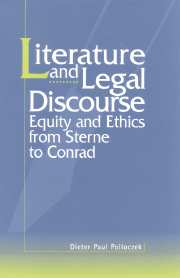Book contents
- Frontmatter
- Contents
- Preface
- Chapter 1 Introduction
- Chapter 2 Trappings of a transnational gaze: legal and sentimental confinement in Sterne's novels
- Chapter 3 Reinstitutionalizing the common law: Bentham on the security and flexibility of legal rules
- Chapter 4 Aporias of retribution and questions of responsibility: the legacy of incarceration in Dickens's Bleak House
- Chapter 5 A curse gone re-cursive: the case and cause of solidarity in Conrad's The Nigger of the “narcissus”
- Chapter 6 Conclusion
- Notes
- Index
Chapter 4 - Aporias of retribution and questions of responsibility: the legacy of incarceration in Dickens's Bleak House
Published online by Cambridge University Press: 22 September 2009
- Frontmatter
- Contents
- Preface
- Chapter 1 Introduction
- Chapter 2 Trappings of a transnational gaze: legal and sentimental confinement in Sterne's novels
- Chapter 3 Reinstitutionalizing the common law: Bentham on the security and flexibility of legal rules
- Chapter 4 Aporias of retribution and questions of responsibility: the legacy of incarceration in Dickens's Bleak House
- Chapter 5 A curse gone re-cursive: the case and cause of solidarity in Conrad's The Nigger of the “narcissus”
- Chapter 6 Conclusion
- Notes
- Index
Summary
One of the causes of the delusion which attributes to the higher orders of pre-eminence in relative moral aptitude, i.e. in effective benevolence, is the association by which men are led to regard a man's benevolence as being in proportion to his benificence.
Bentham, Constitutional CodeThe costs had absorbed the whole case, all the fortunes involved. And so the fantastic fog of Chancery is dispersed-and only the dead do not laugh.
Nabokov, Lectures on LiteratureOUTLASTING DISAPPOINTMENT UNDER POSITIVE LAW
In Bleak House, Dickens revisits, more than in any other of his novels, the complexity of expectations that is at the center of Bentham's project. He shares with Bentham a sense of disappointment about the complex ways the common law is practiced. However, while his text displays a high degree of formal complexity, Dickens does not, generally speaking, allow the reader to diagnose specific social problems of complexity, which the text depicts, as symptoms of an identifiable cultural crisis.
Among Dickens's novels, Bleak House stands out because of the unique wayit combines encyclopedic density with formal innovation, engaging in semantic and, to a degree, semiotic problems of order and coherence. Bymeans of a specific formal disintegration in terms of length, density, and closure, the text participates in, and is meant to influence, symptoms of what many of Dickens's contemporaries perceive as the role of the law in social and psychological disintegration. However, their perception of unconnected symptoms of disintegration on the level of responses to legal practices may already express a defensive mechanism.
- Type
- Chapter
- Information
- Literature and Legal DiscourseEquity and Ethics from Sterne to Conrad, pp. 124 - 202Publisher: Cambridge University PressPrint publication year: 1999



